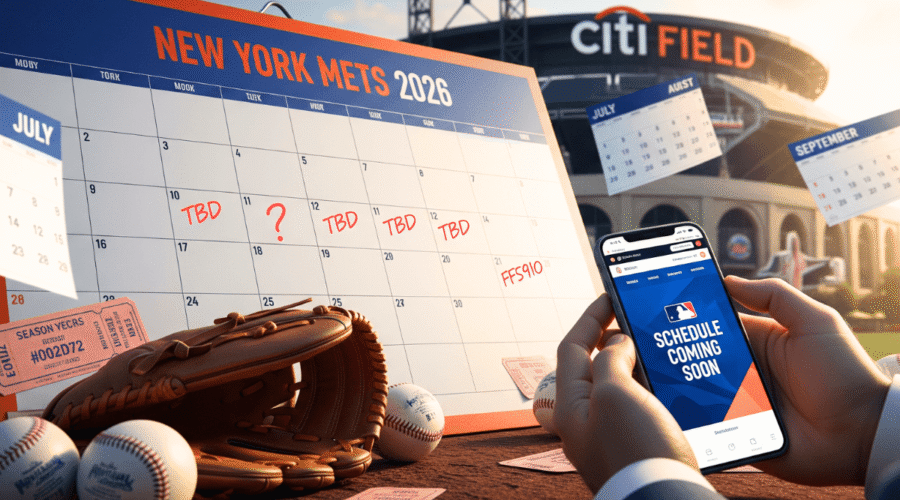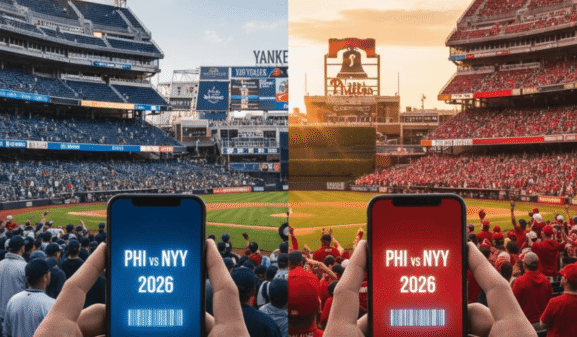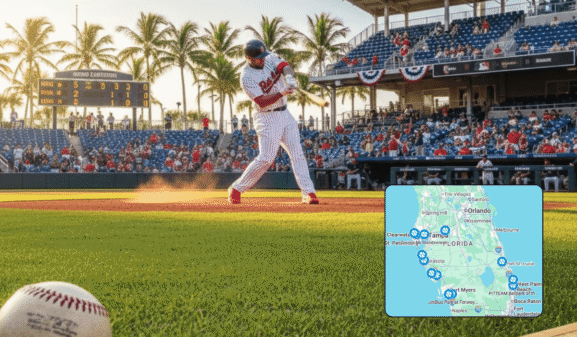New York Mets 2026 Schedule Release Date: Predictions and Rumors Point to September
MLB releases 2026 regular-season schedule
The anticipation builds as summer fades and baseball fans across New York continue their vigil for the New York Mets‘ 2026 schedule release date. What began as a standard expectation for a mid-July announcement has evolved into an unprecedented waiting game that’s now stretching well into August 2025. While predictions and rumors initially suggested the usual summer timeline, industry insiders are now pointing toward a September release that would mark a return to MLB’s historical patterns from nearly a decade ago.
For Mets fans eager to plan their 2026 Citi Field visits, spring training trips to Port St. Lucie, or cross-country baseball adventures, this delay represents more than mere inconvenience—it’s reshaping how we think about the traditional baseball calendar and the complex forces that drive America’s pastime behind the scenes.
Quick Takeaways
- MLB’s (and of course, New York Mets) 2026 schedule remains unreleased as of late August 2025, breaking the July pattern established since 2019
- Historical analysis shows September releases were standard practice from 2012-2018, suggesting current delays may revert to past timing
- Broadcasting rights negotiations and collective bargaining concerns are driving the extended delay beyond typical summer announcements
- Industry predictions and rumors now converge on a September 2025 release date, aligning with pre-2019 historical patterns
- Season ticket deposits remain available while fans await official schedule confirmation for travel and attendance planning
- The delay affects all 30 MLB teams equally, with no franchise receiving advance scheduling information
Breaking from Recent Summer Patterns
The absence of a 2026 MLB schedule announcement by late August marks a dramatic departure from the consistent pattern established since 2019. Recent releases followed a reliable summer timeline: the 2025 schedule arrived on July 18, 2024, while the 2024 schedule was announced on July 13, 2023. This predictable summer window had become the new normal for baseball planning.
Past Release Dates
| Year | Date |
| 2025 | July 18th, 2024 |
| 2024 | July 13th, 2023 |
| 2023 | August 24th, 2022 |
| 2022 | August 4th, 2021 |
| 2021 | July 9th, 2020 |
| 2020 | August 12, 2019 |
| 2019 | August 22, 2018 |
| 2018 | September 12, , 2017 |
| 2017 | September 14, 2016 |
| 2016 | September 8, 2015 |
| 2015 | September 8, 2014 |
| 2014 | September 10, 2013 |
| 2013 | September 12, 2012 |
| 2012 | September 14, 2011 |
However, this recent July pattern represented a significant shift from an earlier era when September releases defined the baseball calendar. Historical release data reveal two distinct periods in MLB scheduling: from 2012 to 2018, the league consistently released schedules in September, with announcement dates ranging from September 8 to September 14 of the preceding year. The September 2018 release of the 2019 schedule marked the end of this pattern, as MLB subsequently adopted summer announcements beginning in 2019.
The current delay suggests MLB may be reverting to the September release window that characterized the 2012-2018 period. This historical precedent indicates that early fall announcements were once standard operating procedure, making the current timing less unprecedented than initially appeared. The shift back could reflect changing industry dynamics that mirror the conditions that originally drove September releases during that earlier period.
Understanding this historical context helps frame the current situation not as an aberration, but potentially as a return to proven scheduling practices that served the league well for nearly seven years. The question becomes whether this represents a temporary reversion or signals a permanent return to fall announcement timing.
Read more: How Many Days Until MLB Playoffs 2025 Starts? Your Complete Countdown Guide
Complex Factors Driving the Extended Delay
Multiple industry complications have converged to create an unprecedented scheduling bottleneck affecting all 30 franchises. Broadcasting rights restructuring remains the primary concern, as ESPN’s contract termination after the 2025 season created a significant gap in national television coverage that MLB must fill before committing to specific game dates and times.
Commissioner Rob Manfred had initially indicated these negotiations would conclude by late July, but the continued absence of a schedule release suggests these discussions have proven more complex than anticipated. The financial implications of these broadcast partnerships extend far beyond simple television revenue—they affect everything from game start times to playoff scheduling to regional blackout policies that impact how fans consume baseball.
The collective bargaining agreement expiring December 1, 2026, adds another substantial layer of complexity to scheduling decisions. Labor negotiations historically influence schedule release timing, as league officials prefer finalizing broadcast partnerships and potential rule changes before committing to the intricate logistics of a 162-game season across 30 markets.
Predictions from industry insiders suggest MLB is strategically maintaining flexibility while these negotiations continue, avoiding premature scheduling commitments that might complicate ongoing discussions. The rumors circulating within baseball circles point to September as the target window, providing adequate time for resolution while maintaining the traditional lead time fans expect for season planning.
Venue considerations have largely been resolved, with the Tampa Bay Rays confirming their return to the repaired Tropicana Field for the 2026 season. Commissioner Manfred’s July 2025 statement anticipated the Rays would play at their traditional home venue, eliminating this potential scheduling complication that had created uncertainty earlier in the planning process.
Special Events and Coordination Challenges
The 2026 season carries extraordinary logistical demands due to America’s 250th anniversary celebrations, with MLB’s All-Star Game in Philadelphia serving as a centerpiece of the national commemoration. The league has partnered with America250 for various celebratory events throughout the season, requiring extensive coordination with federal agencies, local governments, broadcast partners, and security organizations.
These commemorative celebrations demand scheduling precision that extends far beyond typical baseball considerations. The integration of patriotic themes, special ceremonies, and potential government participation creates coordination requirements that dwarf standard season planning. Every game during this milestone year carries additional significance that must be reflected in scheduling decisions.
The 2026 World Baseball Classic returns from March 5-17, overlapping with traditional spring training schedules and creating international coordination requirements. Games will be held in San Juan, Houston, Tokyo, and Miami, requiring MLB to coordinate with international baseball federations while adjusting season-opening timelines and managing player availability across multiple time zones and regulatory environments.
These global tournament requirements affect not just timing but also venue scheduling, player rest periods, and broadcast coordination across multiple continents. The complexity of integrating international competition with domestic league play creates scheduling matrices that require months of careful planning and coordination with multiple stakeholders.
Current rumors suggest these special event requirements are contributing significantly to the delay, as MLB works to ensure the 2026 season properly honors both America’s 250th anniversary and international baseball traditions while maintaining the competitive integrity fans expect.
Read more: 2026 MLB Opening Day Schedule Release Date: Rumors & Predictions
Industry Speculation and Emerging Predictions
Baseball community discussions across social media platforms and fan forums reflect widespread speculation about the timing, with many expecting the announcement to follow historical September patterns rather than recent July releases. Industry insiders participating in these conversations suggest MLB may be strategically holding the schedule to maintain negotiating leverage with potential media partners while resolving outstanding contractual issues.
Predictions emerging from baseball industry sources now consistently point to a September 2025 release window, which would align perfectly with the 2012-2018 historical pattern. This timing would provide MLB with additional weeks to finalize broadcasting partnerships and coordinate special event logistics without rushing critical decisions that affect billions of dollars in revenue and millions of fan experiences.
The rumors circulating within baseball operations circles suggest the delay reflects prudent business management rather than organizational dysfunction. Sources familiar with the scheduling process indicate MLB is prioritizing long-term strategic positioning over maintaining recent timeline expectations, viewing the temporary fan inconvenience as acceptable for achieving optimal business outcomes.
Minor league teams, including the Syracuse Mets, have already released their 2026 schedules with Opening Day scheduled for March 27. This indicates the delay is specifically related to major league considerations rather than systematic organizational scheduling problems, suggesting the infrastructure exists to move quickly once key decisions are finalized.
The disparity between minor and major league schedule availability reinforces predictions that broadcasting and labor negotiations are the primary delay factors, as these issues primarily affect major league operations while leaving affiliate leagues largely unaffected.
Implications for Mets Fans and Season Planning
While waiting for the official schedule announcement, Mets supporters should prepare for the likelihood of a September 2025 release based on emerging industry predictions and historical precedent. The team continues accepting season ticket membership deposits, with full membership packages expected to launch immediately following the schedule announcement.
Travel planning becomes increasingly challenging with each passing week of delay, as popular hotels and travel packages in destination cities typically require earlier booking for optimal pricing and availability. Fans planning multi-city baseball trips or seeking premium accommodations should consider making flexible reservations that can be adjusted once the schedule arrives, though this strategy carries its own risks and costs.
The Mets organization has maintained consistency with MLB’s league-wide communication strategy of avoiding speculation about release timing, leaving fans to rely on industry rumors and historical analysis for guidance. Season ticket holders should monitor official team communications channels for updates about membership sales and ticket availability, as these announcements typically follow quickly after schedule releases.
For fans planning specific events like birthday celebrations, anniversaries, or group outings at Citi Field, the delay creates particular challenges in securing desired dates and seating options. The compressed timeline between schedule release and season ticket sales may require quick decision-making when options finally become available.
The delay also affects corporate partnerships, promotional planning, and special event coordination that depend on confirmed game dates. Businesses planning Mets-related events or promotions must now build additional flexibility into their 2026 planning processes to accommodate the uncertain timeline.
Conclusion
The extended wait for the New York Mets’ 2026 schedule reflects the increasingly complex realities of modern baseball operations, where broadcasting partnerships, labor negotiations, and special commemorative events require careful coordination across multiple stakeholders. While predictions and rumors continue swirling around a September release, the delay ultimately demonstrates how far the business of baseball has evolved beyond simple game scheduling.
For Mets fans, patience remains the watchword as the organization navigates these industry-wide challenges. The eventual schedule release will provide the comprehensive fixture list that enables ticket sales, travel planning, and the seasonal anticipation that defines baseball’s enduring appeal. When that announcement finally arrives, it will launch what promises to be a historically significant season celebrating both America’s 250th anniversary and the timeless traditions of baseball at Citi Field.
Frequently Asked Questions
Q: When will the New York Mets’ 2026 schedule be released?
A: Based on historical patterns and current industry predictions, the MLB 2026 schedule is now expected in September 2025, representing a return to the release timing used from 2012-2018 rather than the recent July pattern established since 2019.
Q: Why has the 2026 schedule been delayed beyond recent summer patterns?
A: Broadcasting rights negotiations following ESPN’s contract termination, the upcoming collective bargaining agreement expiration in December 2026, and coordination requirements for America’s 250th anniversary celebrations and the World Baseball Classic are creating extended delays beyond typical summer timing.
Q: How does this delay compare to historical MLB release patterns?
A: While recent years (2019-2025) featured consistent July releases, MLB regularly released schedules in September from 2012-2018, making the current timing a return to established past practices rather than an unprecedented organizational failure.
Q: What should Mets fans do while waiting for the schedule announcement?
A: Continue monitoring official MLB and team communications, maintain season ticket deposits, research potential travel destinations, and prepare to act quickly once the schedule is released, as popular games and premium seating typically sell rapidly following announcements.
Q: Will this delay affect season ticket pricing or availability?
A: The scheduling delay should not impact season ticket pricing structures or membership availability, though the compressed timeline between schedule release and sales launch may create more competitive demand for popular game dates and seating locations.


